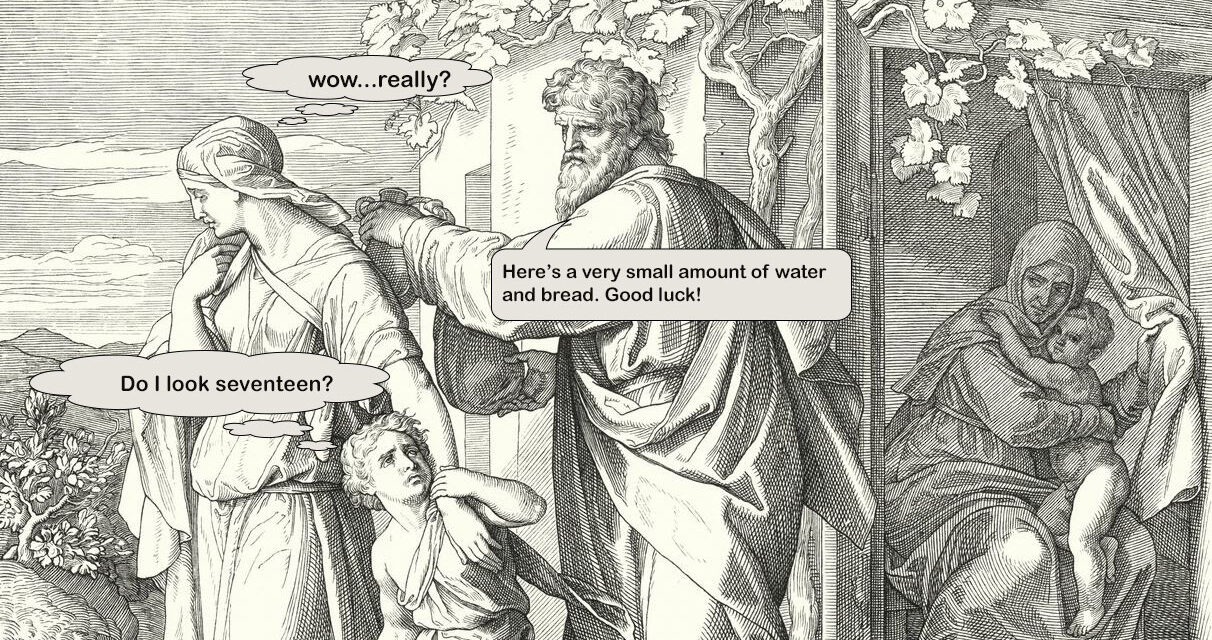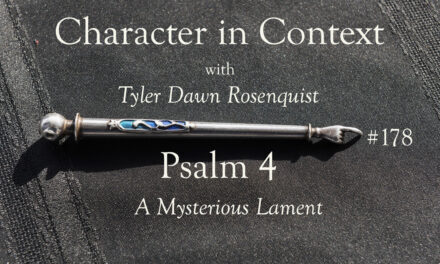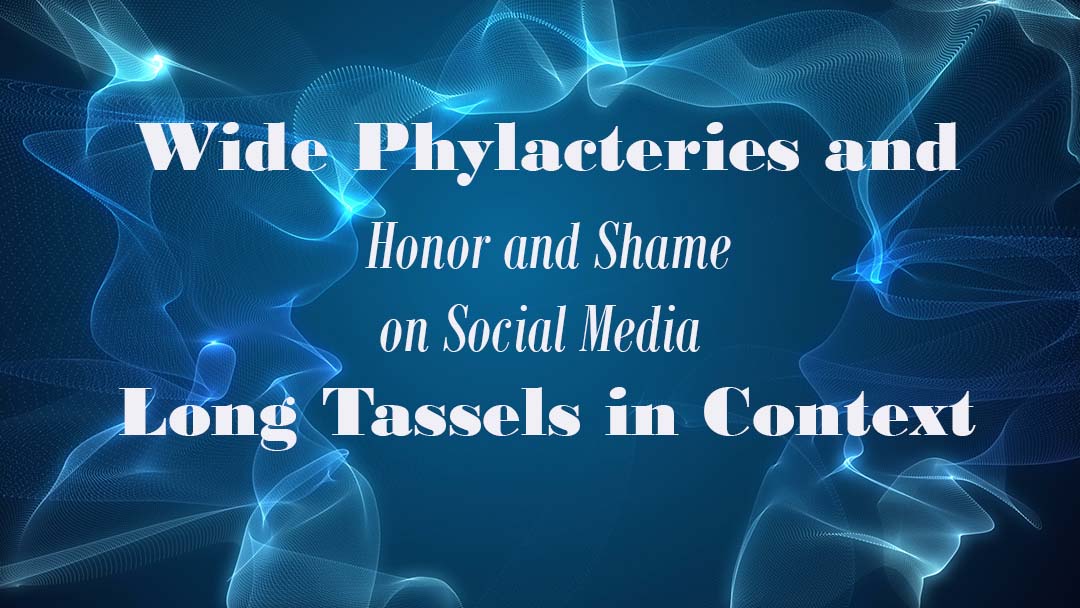I can’t even begin to tell you how happy I am that I can teach this chapter without having to go into gory details about sexual nonsense and, as such, anyone can listen to this Context for Kids supplemental teaching on the first portion of Gen 21, which covers the birth of Isaac and the exile of Ishmael and Hagar. Things won’t get awkward again until Gen 29, thankfully—at least not in ways I would end up in an ankle bracelet for talking to kids about.
If you can’t see the podcast player, then click here. For a version on YouTube, click here.
Genesis 21 isn’t the actual beginning of the story of the dysfunctionality of the family of Abraham, but it’s where we really start seeing the ongoing strain caused by how Abraham and Sarah have decided to do things, as well as the recurring theme of parental favoritism—which we will see through the time of David as a big problem, and there is just a lot of ancient Near Eastern context as far as the laws behind what they are doing and why.
Hi, I am Tyler Dawn Rosenquist, and welcome to Character in Context, where I teach the historical and ancient sociological context of Scripture with an eye to developing the character of the Messiah. However, now I am exclusively working to teach and make disciples of kids over at Context for Kids, so this portion of my ministry is currently devoted to teaching adults how to teach kids by making sure that we are supporting their growth and faith in the Messiah. I want you to be able to answer their hard questions about the text instead of feeling like you have to blow them off. Kids are our full-blown brothers and sisters in Christ. Let’s stop sidelining them with cute stories designed to make the people in the Bible look like perfect heroes and instead teach kids how to take Yeshua/Jesus seriously as the only true hero of the Bible and the greater Moses, greater Temple, and greater Prophet whom Matthew tells us He is. I still have a ton of more advanced teachings for grownups at theancientbridge.com and on my YouTube channel. I also have curriculum books and all that jazz available on Amazon. All Scripture this week is from the CSB, the Christian Standard Bible.
We have three stories going on here in chapter 21—first of all, Sarah finally gets pregnant and has a baby in an account that is shockingly short considering we’ve all been waiting for this birth since the end of chapter 11! Next, we have the puzzling account of Sarah sending away Hagar and Ishmael with like nothing but a skin of water and enough maggoty bread to last three stinking days—oh wait, that’s The Two Towers. Finally, we have part two of Abraham’s dealings with King Abimelech of the Philistines, who realizes that although Abraham cannot be trusted, he is indeed favored by his God. Thank goodness there is nothing in here that young kids can’t hear as in the last two chapters, but I won’t be teaching it at kid level today. We have to talk about ancient Near Eastern law codes and what they reveal to us about Sarah’s rights and expectations under ANE law as well as Hagar’s rights. Remember, Torah is not yet given and so any law we find in the Torah cannot be automatically understood as being self-evident to Abraham and Sarah. Indeed, much of Genesis was quite baffling until the discoveries over the last 150 to 200 years of the various law codes from the Sumerians, Babylonians, Assyrians, and Hittites. A terrific book I recommend on this is Martha Roth’s Law Collections from Babylonia and Asia Minor (affiliate link). I read it from cover to cover about ten years ago and it is just so good. Many “aha!” moments for sure. And after you read Hittite law, you will know why Isaac and Rebekah were so miserable with Esau’s wives. Gotta say that you shouldn’t have to write a special law telling people not to bite off other folks’ noses, okay?
Right off the bat, we have God remembering Sarah who then gets pregnant with Isaac and gives birth. In like two sentences. BOOM. But ancient Near Eastern writings (or first century for that matter) aren’t always in order and will often be grouped by topic. If you have ever read Jeremiah, then you know it is like being a companion of Doctor Who going backward and forwards as specified by the names of the kings being addressed. Also, the Gospels are notoriously grouped so as to bring together parables or events in order to make a point. The point of ancient writings was to relate truth to the audience, not accuracy. They are entirely different things sometimes. Modern histories operate by different rules that would have bored the Biblical authors to death and back. We cannot impose our sensibilities and standards backward onto them and judge them for not measuring up to the rules we made up during and after the Enlightenment. We gotta let the Bible be the Bible, which was written for our benefit but not to us or by us or in our language or style or anything. Doesn’t mean that we can’t learn to be God’s image-bearers but it does make the context very confusing at times. Let’s look at the account of Sarah’s long-awaited pregnancy:
The Lord came to Sarah as he had said, and the Lord did for Sarah what he had promised. Sarah became pregnant and bore a son to Abraham in his old age, at the appointed time God had told him
Why did I point out that the Bible isn’t always telling stories in order? Well, because Sarah might or might not have been pregnant already when Abimelech took her. If not then we have an extremely narrow window for their moving everyone and everything south from Hebron to Beersheba, Sarah being taken, and Abimelech and his household suffering from some sort of something that was keeping all of them from having babies, and then Sarah being released. That’s a lot needing to happen within a paltry three months, give or take a few months as the promise was that Sarah would be a mom “about this time” next year. And I have my reasons for believing that she might well already be pregnant. I mean, this was a miracle, right? But we know from Genesis 17 that Abraham wasn’t rejoicing over the prospect of Sarah having a son who would displace Ishmael, whom he loves and wants for his heir. Sarah heard the promise and legally, Abraham couldn’t deny her conjugal relations. We’ve already seen the rift between them after the pregnancy of Hagar and as, after chapter 22, we find that they have been living apart—with Isaac living with Sarah to the north and Abraham living where Hagar will move to in this chapter. Things aren’t good between them, and they haven’t been for all of Ishmael’s life I imagine. We can’t blame or scorn Abraham for loving Ishmael, who is blameless in all the drama. They have thirteen years of history before Sarah ever falls pregnant. And each generation of his family through Joseph repeats the same traumatic story of favored children and the resulting fractures to the respective families. But, I digress—the Lord has fulfilled His promise and Sarah bears a son.
Abraham named his son who was born to him—the one Sarah bore to him—Isaac. When his son Isaac was eight days old, Abraham circumcised him, as God had commanded him. Abraham was a hundred years old when his son Isaac was born to him.
We have this strange three-fold construction here linking Abraham and Isaac, which reads oddly but it isn’t really that crazy when we look through the Bible and see repetition during significant events. Abraham names Isaac, kinda, because God had specifically told Abraham that would be his name. God has named both of Abraham’s sons personally. Isaac, of course, is tied to the word that can mean laughter or mocking or play depending on the context. And we have this odd threefold declaration of his name. Isaac was born to Sarah, Isaac was circumcised at eight days old, and Isaac was born when Abraham was a hundred years old—making Sarah ninety. But Isaac is sort of like furniture on a set—he is the object of the actions of God and his parents. Nothing about him being special or anything, which is rather odd. All this waiting and we just get this brief birth announcement where he still doesn’t seem to be very important and, in fact, Isaac never gets much attention in the Bible compared to Abraham and Jacob. He’s like this strange blip in the story—the focus of a lot of action while really doing nothing of merit himself. His birth is a miracle, the very first birth miracle in the Bible out of seven (Isaac, Jacob, Joseph, Samson, Samuel, John the Baptist, and Jesus) but Isaac’s birth is also a disappointment because the lead in has been so dramatic. He is the only one of the three patriarchs who doesn’t have his name changed later. When God names you, it’s correct the first time. And I do want to mention that right now we have the fulfillment of every promise of God that would occur during the life of Abraham.
Sarah said, “God has made me laugh, and everyone who hears will laugh with me.” She also said, “Who would have told Abraham that Sarah would nurse children? Yet I have borne a son for him in his old age.”
The interpretation on this is controversial because it isn’t clear whether Sarah is complaining that people will laugh at her (in her admittedly ridiculous situation—I mean, it would be a viral video now of her nursing a baby and people would be crying “fake news!”) or if she is laughing with joy. It can actually go either way but I find myself wondering about the timing of their move from Hebron to Beersheba when Sarah is supposed to be getting pregnant at any time. Did Mamre believe that Sarah was Abraham’s unmarried sister too? If so, after all those years of them being allies, it would have been hard to explain why Sarah was pregnant and I am not just talking about her age! It would have been quite a scandal. Perhaps they had to get out of there to avoid the admission of having misled an ally. It wouldn’t have been out of character for Abraham—after all, when he met Mamre he was just another strange man who might take Sarah, right?
The child grew and was weaned, and Abraham held a great feast on the day Isaac was weaned.
So, at this point, Isaac is probably three and he has passed the critical first phase of life toward survivability. Infant mortality was incredibly high in the ancient world. I know during the time of Jesus/Yeshua that a third of babies in the Land were dead before they were a year old. So, they were nursed as long as possible and then when they were about three or so they were weaned and then it was the time for celebration and not before. It should be cause for celebration and if Abraham failed to do this then he would be dishonoring Sarah and his own house. This had to happen regardless of his personal feelings about Ishmael being permanently replaced as per ANE law which gave precedence to any child of the wife or senior wife. Hagar was still a slave and therefore not a full wife but a concubine. Likely he had no relations with her after she became pregnant. But we have to remember that Abraham has failed to protect Sarah twice at this point, from being taken by other men. And Hagar’s son is now likely sixteen or seventeen years old, the age at which a person was likely to go on to live a full life and especially if they were male and didn’t have to face the dangers of childbirth.
But Sarah saw the son mocking—the one Hagar the Egyptian had borne to Abraham. So she said to Abraham, “Drive out this slave with her son, for the son of this slave will not be a coheir with my son Isaac!”
Different translations render this as laughing, playing, mocking or scoffing. This had to be an incredibly tense situation as Ishmael had been raised for thirteen years with the understanding that he was not only the only heir of his father, but the only possible heir. We can scarcely imagine how his life changed at the birth of Isaac and now that Isaac has survived the prime infant mortality zone of 0-3 years and a feast is being thrown to celebrate that, there had to be bitterness over this helpless intruder who was supplanting him because of a social technicality. Now he is simply the second son of Abraham, despite being older, with a slave for a mother. And Sarah was having none of it, undoubtedly still unhappy about Hagar’s rebellion and all of those years watching Abraham love and raise Hagar’s son. She doesn’t even call Ishmael Abraham’s son but the son of this slave. I can’t overemphasize the shame of being childless in the ancient world. And, although we can rightly look upon it as cruel, ANE law (specifically the law code of Lipit-Ishtar) gave Sarah the right to send Hagar away in return for her freedom. Abraham had conceded long since that Hagar belonged to Sarah to do with as she pleased, back in chapter 16.
Let’s look at section 25 of the code: If a man married his wife and she bore him children and those children are living, and a slave also bore children for her master but the father granted freedom to the slave and her children, the children of the slave shall not divide the estate with the children of their former master.
But let’s look at this from Sarah’s point of view—remember this is a mess of her own making but it is still a mess that needs a resolution. Any parent would look at this and think, “can’t Isaac just get the double portion and leave a third to Ishmael? They would both be wealthy and well cared for.” What can we imagine going through Sarah’s mind? She is ninety-three-ish at this point and has no idea when she (or her 103 year old husband) might die. Can she trust Abraham to make Isaac his heir? Can she trust Abraham to protect Isaac from Ishmael—a toddler from a near grown man? Does she believe that Abraham’s love for Ishmael gives him a blind spot as to the potential danger? Can she imagine a scenario where Ishmael might take revenge on Isaac for Sarah’s abuse of Hagar?
Things aren’t okay here and so for the second time, Sarah is going to assert her legal rights. The first time was when she gave Hagar (whom she has never called by name) to Abraham as a surrogate so that Sarah could have children. That was her legal right under the laws of the land as Hagar was her property and Abraham couldn’t legally deny Sarah children. Now, Sarah is asserting her right to manumit her slave girl, to release her from slavery and send her away. Abraham was in a real pickle according to the laws they were raised with. This was their normal, their context. It was an insanely cruel world—which is why God was starting to change it with just one family. But it is going to be ugly and the consequences long-lasting, as we will clearly see throughout Genesis. Most importantly, I want you to notice the phrase “drive out” which we also see with the expulsion of Adam from the Garden and it is how Cain refers to God’s punishment, barring him from working the ground. This is our third exile story, which is a big theme in the Bible.
This was very distressing to Abraham because of his son. But God said to Abraham, “Do not be distressed about the boy and about your slave. Whatever Sarah says to you, listen to her, because your offspring will be traced through Isaac, and I will also make a nation of the slave’s son because he is your offspring.”
Displeasing? Ya think? Notice it doesn’t say sons but just son in the singular. When it comes to Abraham and Isaac, it is generally Sarah and God who refer to Isaac as Abraham’s son but when it is coming from Abraham, the word son is more likely to be used with Ishmael. No shock there, an ancient Near Eastern man isn’t going to have any sort of relationship with a three-year-old but Ishmael is practically a man. They have history. Abraham desperately loves Ishmael, and so he should. Whenever Yahweh speaks to Abraham about Ishmael from now on, he calls him the boy but calls Isaac Abraham’s son and especially in chapter 22 when we look at the Akeida, the binding of Isaac. The situation they forced upon Hagar, even though it was technically more honorable in the ANE to be a concubine instead of simply a slave, had created such a complex mess that it appears all the relationships within the family have suffered. Did Abraham resent Isaac, and Sarah too? Did he still desire his heir to be Ishmael? One thing for sure—he didn’t want to send his son away. Indeed, it would have been heartless if he had wanted to do so.
But God had to give Abraham a reality check. No matter how Abraham felt about it, Isaac would be his heir. Isaac was God’s choice. Period. Oddly enough, despite always calling Hagar by her first name (and the only one to do so), when speaking to Abraham he calls her what Abraham called her in chapter 16, the slave woman. Was it a sort of rebuke? Like, what do you care about this woman—you don’t even call her by her name and yet you love her son? Serious disconnect here—and yet, that was the world they lived in. There is a distancing between Abraham and Ishmael that God has been trying to get Abraham to accept since Gen 17. Why did God tell Abraham to do whatever Sarah says? Did He also see Ishmael as a potential danger toward Isaac? Would God be unable to bless Ishmael if he remained in the vicinity of Sarah and Isaac? There is so much bitterness and rancor at this point that it’s hard to imagine Jerry Springer not jumping up and down with glee at the thought of having them all on his show, right? I suppose the one thing we can say is that this is too awful to continue and even though Sarah created this problem through ANE law codes, she also had to be the winner in this situation because God had chosen her to be the mother of Isaac in order to show His power over life and death.
Early in the morning Abraham got up, took bread and a waterskin, put them on Hagar’s shoulders, and sent her and the boy away. She left and wandered in the Wilderness of Beer-sheba.
Is there anyone who isn’t bothered by this? Bread and a skin of water? They are living close by the border of Egypt in the northern Negev. Couldn’t he have sent her with a camel and a donkey and personal servants and money? We keep hearing how rich Abraham is so a little generosity might be nice here. However, everything belonged to Isaac as heir and God had told Abraham to listen to Sarah. Sarah might have been angry at Ishmael dishonoring her son, or scared at real or imagined danger, or simply feeling powerful now that Isaac was weaned, which put her in the position to make demands on behalf of God’s chosen heir for Abraham. I want to give her the benefit of the doubt here, but this is just plain ugly and there is no clear-cut good guy in all of this. So much goes unsaid, but that’s why in the Hellenistic Era books like Jubilees and Enoch and the Testaments of the Patriarchs were written as popular fiction to fill in the blanks of these accounts with “what if” stories. I personally believe that Abraham would have sent Ishmael away with a lot more if he was left to his own devices. But God knew Sarah’s heart in this matter and used it to work a miracle for Ishmael and another visitation for Hagar. Sarah wasn’t getting the last word in the fate of “the slave woman and her son.” Ishmael wouldn’t directly inherit from Abraham but he would be blessed because he was Abraham’s son—as God had promised Hagar all the way back when she was pregnant and on the run from Sarah’s anger. God saw to justice for Ishmael personally. But again, Hagar gets lost in the wilderness on her way back to Egypt. Evidently, she has my lack of an inner GPS.
When the water in the skin was gone, she left the boy under one of the bushes and went and sat at a distance, about a bowshot away, for she said, “I can’t bear to watch the boy die!” While she sat at a distance, she wept loudly. God heard the boy crying, and the angel of God called to Hagar from heaven and said to her, “What’s wrong, Hagar? Don’t be afraid, for God has heard the boy crying from the place where he is. Get up, help the boy up, and grasp his hand, for I will make him a great nation.” Then God opened her eyes, and she saw a well. So she went and filled the waterskin and gave the boy a drink. God was with the boy, and he grew; he settled in the wilderness and became an archer. He settled in the Wilderness of Paran, and his mother got a wife for him from the land of Egypt.
Again, this is so relatable. Regardless of what Hagar has done over the last sixteen years—and we don’t know for sure. I mean, maybe she has been teaching Ishmael to hate Isaac and Sarah, who knows? Lost with her son in the wilderness, far from any settlements, with no water. It’s hot during the day and cold at night. She helps him to lay down under a bush for shelter and then she walks off a distance because she just can’t bear to see her son die. She begins to lament, loudly. But it is the voice of Ishmael that God hears—why? It’s a mystery. Last time, God heard and responded to the cries of Hagar but this time, he is responding to the boy. I believe it is on account of Abraham. Had Abraham taught Ishmael to pray and call on the name of the Lord? I would certainly hope so. Ishmael had been circumcised three or four years earlier and so he was a part of God’s covenant with the household of Abraham even if Abraham’s land covenant descendants wouldn’t come through Ishmael. Ishmael, unlike Moab, Ammon and Esau, wasn’t given land by Yahweh. He lived as a wanderer in the wilderness and we will see that some of his descendants became caravan traders dealing in merchandise (including slaves) to Egypt. But land isn’t the only blessing available from God.
Although God hears the voice of Ishmael, He speaks to Hagar again, calling her by name. He tells her to get the boy up because he has a blessed future and will become a nation—the same promise she received in Gen 16. For the second time, God provides a well for her—making up for the lack of supply received from Abraham. They remained in the wilderness, with Ishmael as a hunter and Hagar got for him an Egyptian wife. And that’s almost the last we hear of him. We will get his genealogy later and he will return for the burial of Abraham. I will put out a second part about Abraham and Abimelech and Phicol, part two. In a week or so.





















